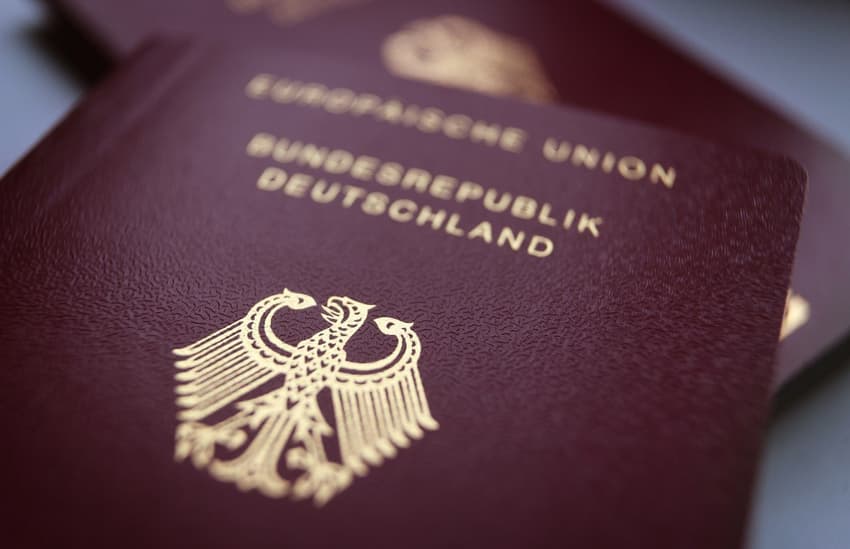Germany ties for top spot of 'most powerful passport in the world'

For the first time, Germany snagged the top spot in an annual ranking of the world's most powerful passport. It shares the title with a handful of other countries.
German citizens are allowed to travel to 194 countries and territories without first applying for a visa.
This puts Germany's passport in a joint first place in the "Henley Passport Index 2023" - along with Spain, France and Italy, as well as Japan and Singapore.
In last year’s ranking, only Singapore came in first, with its citizens then able to travel to 193 countries, whereas Germany received a shared second place, having visa-free access to 190 countries.
That means that its citizens can receive both visa-free entries and un-bureaucratic visa issuance on arrival.
For the past 19 years, London-based law firm Henley & Partners has listed the most powerful passports in the world.
READ ALSO: 8 reasons why German citizenship trumps permanent residency
Greater access to the world stage
The average number of countries to which people can travel without a visa has almost doubled since 2006: back then, the average was 58 countries, whereas today it stands at 109, according to the firm.
However, the differences between the most powerful and weakest passports have widened, the firm said.
"The global mobility gap between the countries at the top and bottom of the index is larger than ever," it told Spiegel Online.
Top-ranked Germany offers 166 more countries to which citizens can travel without a visa compared to Afghanistan, which again came in last place.
How easy is it to get a German passport?
New citizenship legislation, set to come into effect as early as April of this year, in part aims to make it easier for non-EU foreigners in Germany to receive a German passport in addition to their current passport.
With a few exceptions, most have been required to give up the citizenship of their home country upon obtaining German citizenship.
The new law would allow for the holding of multiple passports, irrespective of where a foreigner comes from.
The long wait for naturalisation - currently between six and eight years - will also be reduced to five years of residency under the new law, or three if a foreigner is especially well integrated.
READ ALSO: Everything that changes in German citizenship in 2024
Comments
See Also
German citizens are allowed to travel to 194 countries and territories without first applying for a visa.
This puts Germany's passport in a joint first place in the "Henley Passport Index 2023" - along with Spain, France and Italy, as well as Japan and Singapore.
In last year’s ranking, only Singapore came in first, with its citizens then able to travel to 193 countries, whereas Germany received a shared second place, having visa-free access to 190 countries.
That means that its citizens can receive both visa-free entries and un-bureaucratic visa issuance on arrival.
For the past 19 years, London-based law firm Henley & Partners has listed the most powerful passports in the world.
READ ALSO: 8 reasons why German citizenship trumps permanent residency
Greater access to the world stage
The average number of countries to which people can travel without a visa has almost doubled since 2006: back then, the average was 58 countries, whereas today it stands at 109, according to the firm.
However, the differences between the most powerful and weakest passports have widened, the firm said.
"The global mobility gap between the countries at the top and bottom of the index is larger than ever," it told Spiegel Online.
Top-ranked Germany offers 166 more countries to which citizens can travel without a visa compared to Afghanistan, which again came in last place.
How easy is it to get a German passport?
New citizenship legislation, set to come into effect as early as April of this year, in part aims to make it easier for non-EU foreigners in Germany to receive a German passport in addition to their current passport.
With a few exceptions, most have been required to give up the citizenship of their home country upon obtaining German citizenship.
The new law would allow for the holding of multiple passports, irrespective of where a foreigner comes from.
The long wait for naturalisation - currently between six and eight years - will also be reduced to five years of residency under the new law, or three if a foreigner is especially well integrated.
READ ALSO: Everything that changes in German citizenship in 2024
Join the conversation in our comments section below. Share your own views and experience and if you have a question or suggestion for our journalists then email us at [email protected].
Please keep comments civil, constructive and on topic – and make sure to read our terms of use before getting involved.
Please log in here to leave a comment.